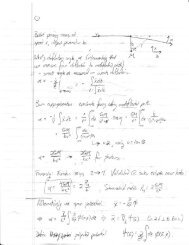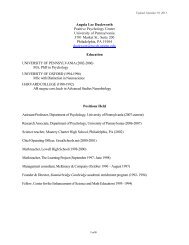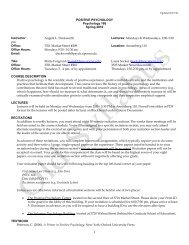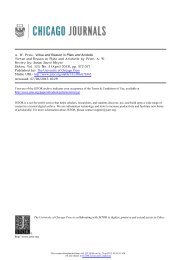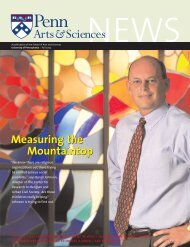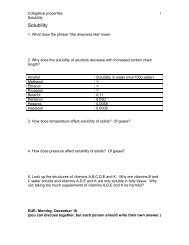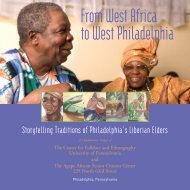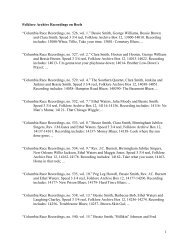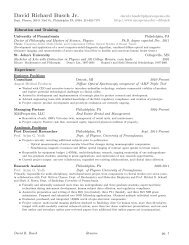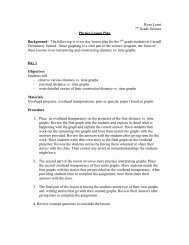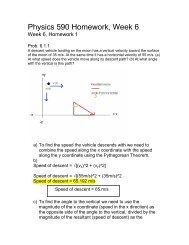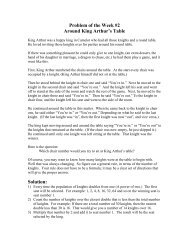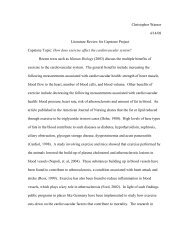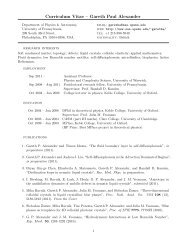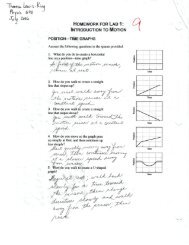Skeptical Thinking in the Classroom and its Impact - School of Arts ...
Skeptical Thinking in the Classroom and its Impact - School of Arts ...
Skeptical Thinking in the Classroom and its Impact - School of Arts ...
Create successful ePaper yourself
Turn your PDF publications into a flip-book with our unique Google optimized e-Paper software.
Student 11 had one <strong>of</strong> <strong>the</strong> best analysis <strong>of</strong> <strong>the</strong> Hope Diamond, but scored lowest <strong>in</strong> <strong>the</strong><br />
horoscope <strong>and</strong> low <strong>in</strong> <strong>the</strong> ghost activity.<br />
Student 2a scored <strong>the</strong> highest <strong>in</strong> <strong>the</strong> Hope Diamond <strong>and</strong> <strong>the</strong> Horoscope activities, but<br />
scored negatively <strong>in</strong> <strong>the</strong> Ghost activity.<br />
These examples show that skepticism is not a monolithic way <strong>of</strong> th<strong>in</strong>k<strong>in</strong>g, but changes<br />
from person to person <strong>and</strong> topic to topic. It seems as though <strong>the</strong>re are many factors that<br />
go <strong>in</strong>to an <strong>in</strong>dividual’s critical th<strong>in</strong>k<strong>in</strong>g process. Some <strong>of</strong> <strong>the</strong> factors that were revealed<br />
by <strong>the</strong> student responses were:<br />
1) Religion: Religious beliefs that are <strong>in</strong>stilled from birth or a very young age have a<br />
pr<strong>of</strong>ound effect on <strong>the</strong> way a student will analyze data. Many students mis<strong>in</strong>terpret,<br />
ignore, or disbelieve contradictory evidence.<br />
a) Mis<strong>in</strong>terpretation<br />
i) Innocent Mis<strong>in</strong>terpretation: Students that are guilty <strong>of</strong> mis<strong>in</strong>terpretation may<br />
be new to logical <strong>in</strong>vestigation <strong>and</strong> may just need to sharpen <strong>the</strong>ir data<br />
analysis skills<br />
ii) Biased mis<strong>in</strong>terpretation: Students that are guilty <strong>of</strong> biased mis<strong>in</strong>terpretation<br />
have an idea <strong>of</strong> what <strong>the</strong>y believe <strong>the</strong> data should be <strong>and</strong> make <strong>the</strong> data fit<br />
<strong>the</strong>ir <strong>in</strong>valid <strong>in</strong>terpretation.<br />
b) Ignor<strong>in</strong>g evidence: Students that are guilty <strong>of</strong> ignor<strong>in</strong>g evidence will put forth<br />
<strong>the</strong>ir <strong>in</strong>valid view without address<strong>in</strong>g <strong>the</strong> factual contradictory evidence.<br />
c) Disbeliev<strong>in</strong>g contradictory evidence: Students guilty <strong>of</strong> disbeliev<strong>in</strong>g<br />
contradictory evidence cl<strong>in</strong>g to <strong>the</strong>ir <strong>in</strong>valid views <strong>and</strong> believe that <strong>the</strong> scientific<br />
data is wrong or made up to discredit a po<strong>in</strong>t <strong>of</strong> view.<br />
2) Mass media/Popular Culture:<br />
a) Many <strong>of</strong> <strong>the</strong> students, <strong>in</strong> <strong>the</strong> ghost activity <strong>in</strong> particular, say <strong>the</strong>ir <strong>in</strong>valid<br />
assessment <strong>of</strong> <strong>the</strong> data presented was fueled by television programs such as Ghost<br />
Hunters on <strong>the</strong> Sci-Fi channel. These programs hook people with a flashy<br />
presentation, charismatic performers, scientific sound<strong>in</strong>g language, <strong>and</strong> scientific<br />
sound<strong>in</strong>g equipment. The ma<strong>in</strong> problem with <strong>the</strong> programs is that <strong>the</strong>y do not<br />
faithfully follow <strong>the</strong> scientific method or <strong>the</strong> pr<strong>in</strong>ciple <strong>of</strong> Occam’s razor when<br />
evaluat<strong>in</strong>g <strong>the</strong>ir so called data.<br />
3) Personal experience:<br />
a) Friends or family’s anecdotal stories <strong>of</strong> a paranormal experience. Many students<br />
related experiences that family members had with ghosts, fortune tellers, curses,<br />
psychics, <strong>and</strong> astrology. The students were more likely to believe an impassioned<br />
s<strong>in</strong>cere story from a friend or relative than anyth<strong>in</strong>g presented by an article or<br />
teacher. Most <strong>of</strong> <strong>the</strong>se stories came out dur<strong>in</strong>g class discussions. The way <strong>the</strong><br />
students told <strong>the</strong> stories were very impassioned <strong>and</strong> s<strong>in</strong>cere. Most <strong>of</strong> <strong>the</strong><br />
discussions regard<strong>in</strong>g a story like that ended with <strong>the</strong> student say<strong>in</strong>g someth<strong>in</strong>g to<br />
<strong>the</strong> effect <strong>of</strong>: “I don’t care what you say, I believe my Aunt” or “Science can’t<br />
prove that it didn’t happen”<br />
b) Student personal experience: The majority <strong>of</strong> <strong>the</strong>se stories came out dur<strong>in</strong>g <strong>the</strong><br />
discussions as well. The few students that claim to have experienced an event<br />
related that <strong>the</strong>ir experience was very conv<strong>in</strong>c<strong>in</strong>g <strong>and</strong> it would take a lot to<br />
conv<strong>in</strong>ce <strong>the</strong>m o<strong>the</strong>rwise.



